2022年外研版中考英语二轮复习话题八 语言学习与通信课件(71张)
文档属性
| 名称 | 2022年外研版中考英语二轮复习话题八 语言学习与通信课件(71张) |  | |
| 格式 | pptx | ||
| 文件大小 | 321.2KB | ||
| 资源类型 | 教案 | ||
| 版本资源 | 外研版 | ||
| 科目 | 英语 | ||
| 更新时间 | 2022-05-23 22:08:01 | ||
图片预览

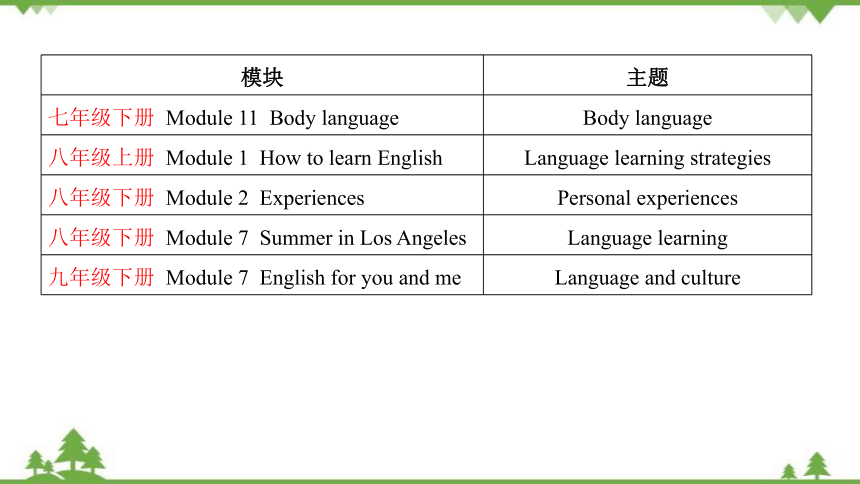
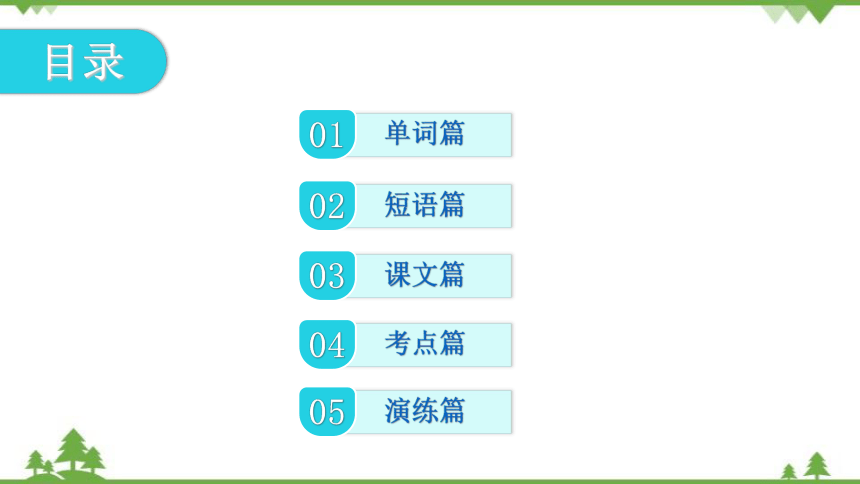
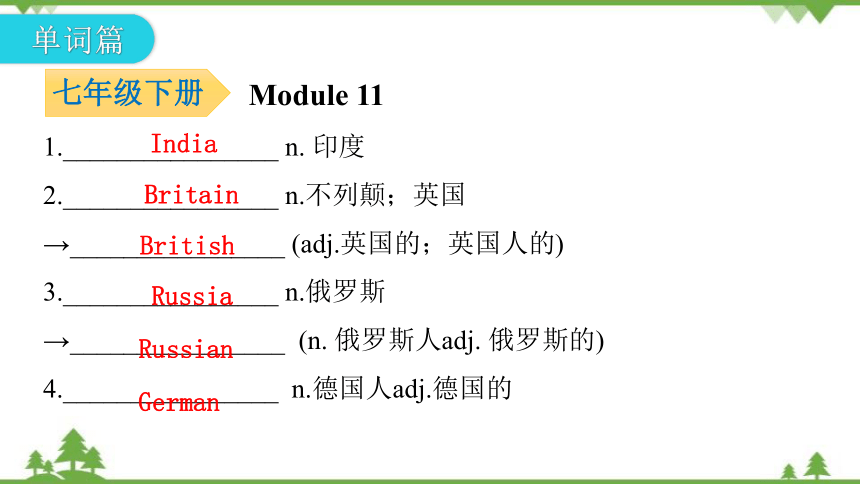
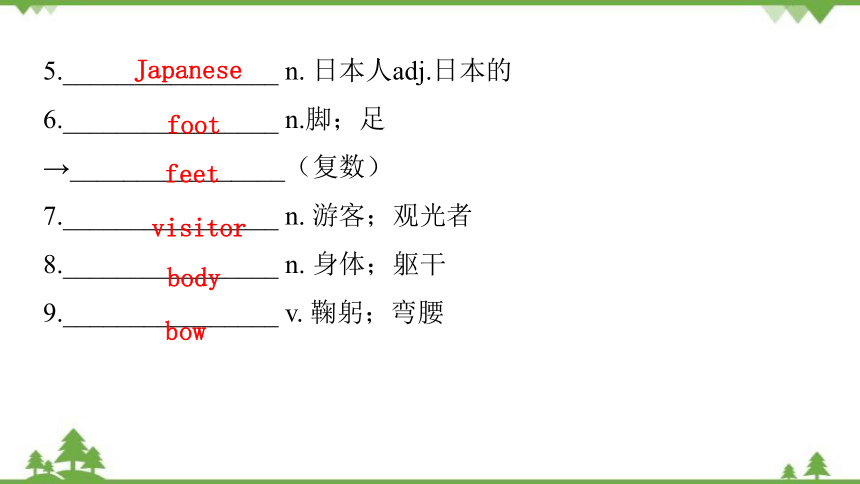
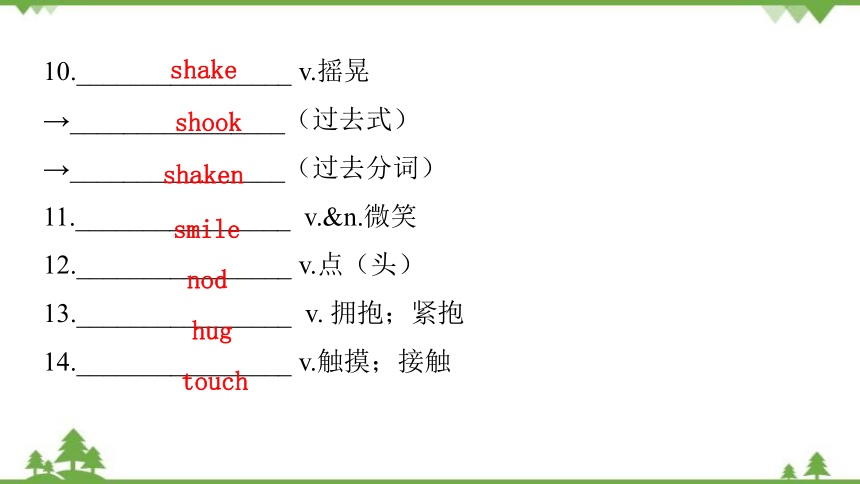
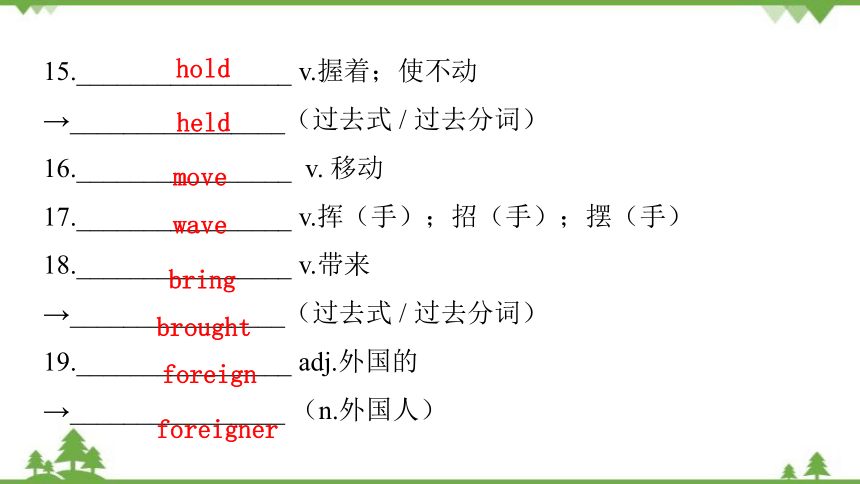

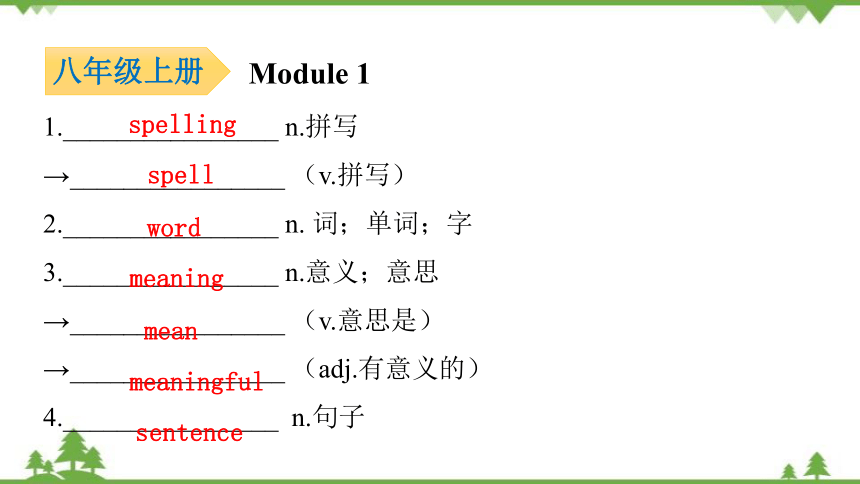
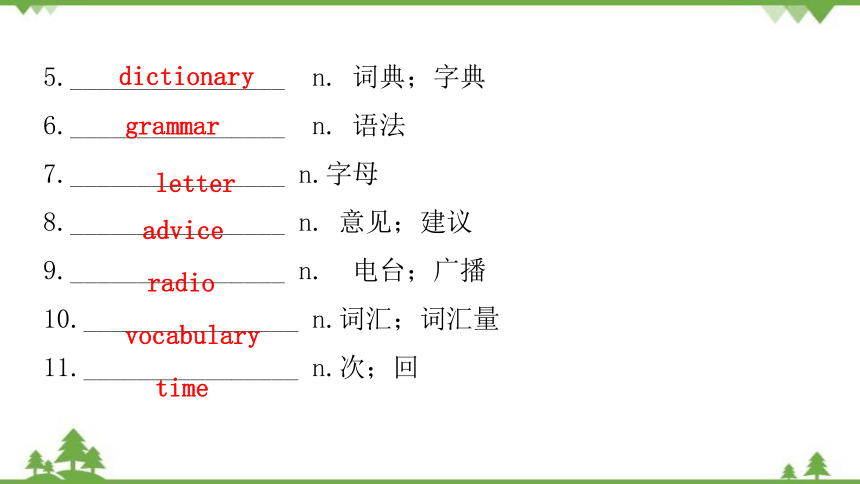
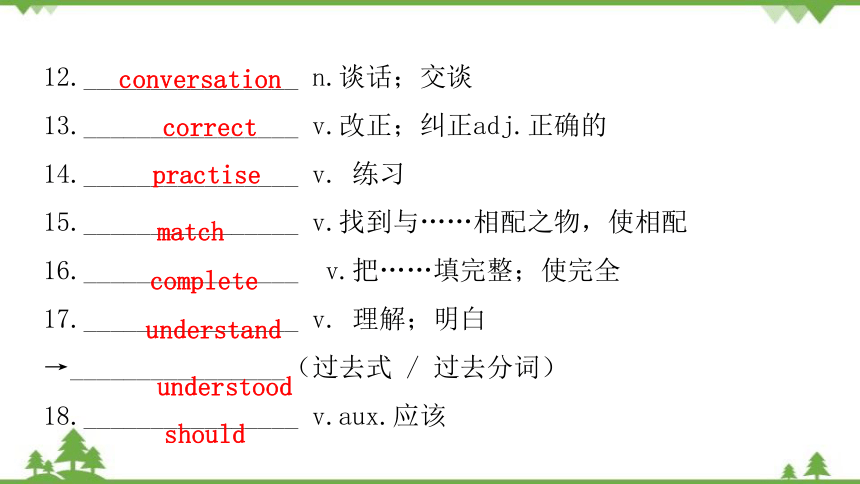
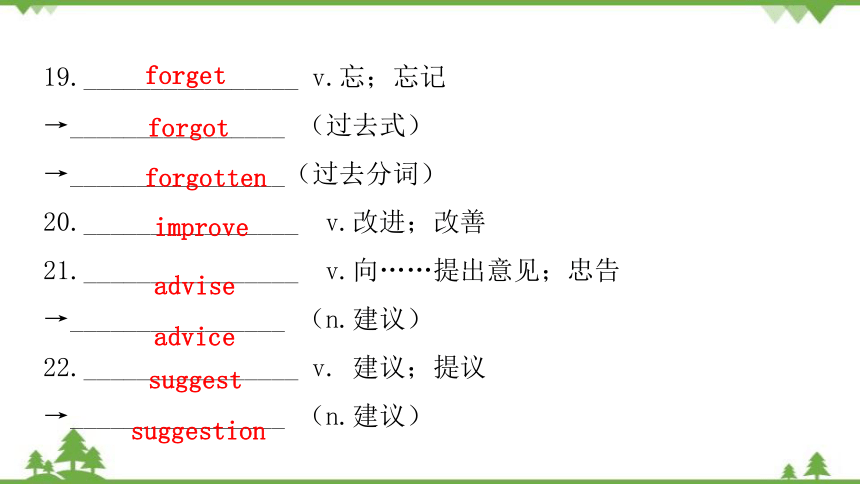
文档简介
(共71张PPT)
教材梳理(WY)
话题八 语言学习与通信
模块 主题
七年级下册 Module 11 Body language Body language
八年级上册 Module 1 How to learn English Language learning strategies
八年级下册 Module 2 Experiences Personal experiences
八年级下册 Module 7 Summer in Los Angeles Language learning
九年级下册 Module 7 English for you and me Language and culture
目录
01
单词篇
02
短语篇
03
课文篇
04
考点篇
05
演练篇
单词篇
七年级下册
Module 11
1.________________ n. 印度
2.________________ n.不列颠;英国
→________________ (adj.英国的;英国人的)
3.________________ n.俄罗斯
→________________ (n. 俄罗斯人adj. 俄罗斯的)
4.________________ n.德国人adj.德国的
India
Britain
British
Russia
Russian
German
5.________________ n. 日本人adj.日本的
6.________________ n.脚;足
→________________(复数)
7.________________ n. 游客;观光者
8.________________ n. 身体;躯干
9.________________ v. 鞠躬;弯腰
Japanese
foot
feet
visitor
body
bow
10.________________ v.摇晃
→________________(过去式)
→________________(过去分词)
11.________________ v.&n.微笑
12.________________ v.点(头)
13.________________ v. 拥抱;紧抱
14.________________ v.触摸;接触
shake
shook
shaken
smile
nod
hug
touch
15.________________ v.握着;使不动
→________________(过去式 / 过去分词)
16.________________ v. 移动
17.________________ v.挥(手);招(手);摆(手)
18.________________ v.带来
→________________(过去式 / 过去分词)
19.________________ adj.外国的
→________________ (n.外国人)
hold
held
move
wave
bring
brought
foreign
foreigner
20.________________ adj.个人的
→________________ (n.个人)
21.________________ adj.礼貌的
→________________ (adj.不礼貌的)
22.________________ adj.粗鲁的;无礼的
23.________________ adv.一起;共同
personal
person
polite
impolite
rude
together
1.________________ n.拼写
→________________ (v.拼写)
2.________________ n. 词;单词;字
3.________________ n.意义;意思
→________________ (v.意思是)
→________________ (adj.有意义的)
4.________________ n.句子
八年级上册
Module 1
spelling
spell
word
meaning
mean
meaningful
sentence
5.________________ n. 词典;字典
6.________________ n. 语法
7.________________ n.字母
8.________________ n. 意见;建议
9.________________ n. 电台;广播
10.________________ n.词汇;词汇量
11.________________ n.次;回
dictionary
grammar
letter
advice
radio
vocabulary
time
12.________________ n.谈话;交谈
13.________________ v.改正;纠正adj.正确的
14.________________ v. 练习
15.________________ v.找到与……相配之物,使相配
16.________________ v.把……填完整;使完全
17.________________ v. 理解;明白
→________________(过去式 / 过去分词)
18.________________ v.aux.应该
conversation
correct
practise
match
complete
understand
understood
should
19.________________ v.忘;忘记
→________________ (过去式)
→________________(过去分词)
20.________________ v.改进;改善
21.________________ v.向……提出意见;忠告
→________________ (n.建议)
22.________________ v. 建议;提议
→________________ (n.建议)
forget
forgot
forgotten
improve
advise
advice
suggest
suggestion
23.________________ v.赞同
→________________ (n.协定)
24.________________ adj.关键性的,非常重要的
25.________________ adj.主要的;最大的
26.________________ adj. 极好的;优秀的
27.________________ adj. 主要的;基础的
28.________________ adj.羞怯的;腼腆的
29.________________ adj.合理的;合乎常情的
agree
agreement
key
main
excellent
basic
shy
natural
30.________________ adv.大声地;出声地
→________________ (adj.大声的)
31.________________ adv. 快地;迅速地
→________________ (adj.快的)
aloud
loud
quickly
quick
1.________________ n. 德国
2.________________ n.法国
→________________ (n.法国人;法语)
→________________ (adj.法国人的;法国的)
3.________________ n.比赛;竞争
→________________ (v.竞争)
八年级下册
Module 2
Germany
France
French
French
competition
compete
4.________________ n.奖品;奖项
5.________________ v.邀请
→________________ (n.邀请)
6.________________ v. 派遣去;命令……去
→________________(过去式 / 过去分词)
7.________________ adj.古老的;古代的
prize
invite
invitation
send
sent
ancient
1.________________ n. 名单;清单
2.________________ n.护照
3.________________ n.文化
→________________ (adj.文化的)
4.________________ n.进步;进展v. 推进
5.________________ n. 客人;宾客
6.________________ n. 友谊;友好
八年级下册
Module 7
list
passport
culture
cultural
progress
guest
friendship
7.________________ v.持续;延续
8.________________ v.提供;供应
9.________________ v. 更喜爱;钟爱
10.________________ v.填满;填充
11.________________ adj.总的;全部的
12.________________ adj. 确定的;无疑的
13.________________ adj. 发疯的;荒唐的
last
provide
prefer
fill
total
certain
crazy
1. ________________ n. 老板;上司
2.________________ n.秘书
3.________________ n.四分之一
4.________________ n.制造业;工业
5.________________ n.印度人adj.印度的
九年级下册
Module 7
boss
secretary
quarter
industry
Indian
6.________________ n.种;类;类型
7.________________ v. 成功;实现
→________________ (n.成就)
8.________________ prep.包括;包含
→________________ (v.包括)
type
achieve
achievement
including
include
短语篇
七年级下册
Module 11
1.握手 ________________
2.事实上 ________________
3.臂挽臂地 ________________
4.一点也不 ________________
5.互相;彼此 ________________
6.个人空间 ________________
shake hands
in fact
arm in arm
not at all
each other
personal space
八年级上册
Module 1
1.犯错误 ________________
2.查;查找 ________________
3.写下;记下 ________________
4.同意某人 ________________
5.请求(给予) ________________
6.对……有益 ________________
make a mistake
look up
write down
agree with sb.
ask for
be good for
八年级下册
Module 2
1.一等奖 ________________
2.编写;写作 ________________
3.创造,编造 ________________
4.到目前为止 ________________
5.与……不同 ________________
6.倒数;倒计时 _______________
first prize
write about
make up
so far
be different from
count down
八年级下册
Module 7
1.在……的结尾 ____________________
2.同时 _______________________
3.取决于;决定于 ________________
4.日常生活 _______________________
5.(与某人)保持联系 ____________________________
6.填写;填充 _______________________
at the end of …
at the same time
depend on
daily life
stay in touch(with sb.)
fill out
九年级下册
Module 7
1.一开始;起初 ____________________
2.取得进步 ___________________
3.同时 ______________________
4.彼此交流 ________________________________
5.与……一起 ___________________
6.共同语言 _____________________
at the beginning
make progress
at the same time
communicate with each other
together with
common language
七年级下册
Module 11
1.多给他们点儿个人空间。
________________________________________________
2.不要和北美人站得太近!
________________________________________________
课文篇
Give them more personal space.
Don’t stand too close to North Americans!
3.那是因为不同国家的人们做法不同。
_____________________________________________________
4.在英国,许多人一点儿也不喜欢别人碰他们。
In Britain many people __________________________________
_____________________.
5.在俄罗斯,人们通常亲吻三次,左、右、左。
In Russia, people usually ___________________________.
That’s because people do different things in different countries.
don’t like other people to touch them at all
kiss three times, left, right, left
八年级上册
Module 1
1.让我们尽可能多地说英语吧。
________________________________________________
2.我们将讨论学习英语的好方法。
________________________________________________
3.为什么不把错误记在我们的笔记本上呢?
________________________________________________
Let’s try to speak English as much as possible.
We’re going to talk about good ways to learn English.
Why not write down our mistakes in our notebooks
4.每天大声拼读新单词是个好主意。
_____________________________________________________
_____________________________________________________
5.看到这些单词的时候就读一读,并且尽量使用它们。
Read the words ________________, and ___________________.
It’s a good idea to spell and pronounce new words aloud every day.
when you see them
try to use them
八年级下册
Module 2
1.太可惜了。
_____________________________________________________
2.我付不起。
_____________________________________________________
3.他们去过很多有趣的地方。
_____________________________________________________
That’s a pity.
I can’t afford it.
They have been to many interesting places.
4.我也参加过很多演讲比赛。
_____________________________________________
I’ve also entered lots of speaking competitions.
八年级下册
Module 7
1.这听起来很荒唐,但是我确实不知道要带什么。
________________________________________________
2.短裤就可以,或者你可以穿轻薄的长裤。
________________________________________________
3.噢,顺便说一下,别忘了带你的护照。
________________________________________________
It sounds crazy, but I don’t know what to take.
Shorts are good, or you can wear light trousers.
Oh, by the way, don’t forget to take your passport.
4.我要在7月底动身,打算在那儿待4周。
I’m ________________________ and I’m going to stay there _____________________.
5.很多家庭和学生建立了亲密的友谊,而且和他们保持着联系。
Many families __________________________ the students and __________________________ them.
leaving at the end of July
for four weeks
form close friendships with
stay in touch with
九年级下册
Module 7
1.无论我们何时见面,我都可以和你说英语。
_____________________________________________
2.你认为今年你在英语方面取得了多大的进步?
____________________ do you think ______________________ in English this year
I can speak English with you whenever we meet.
How much progress
you’ve made
3.如果你坚持不懈地努力,很快你就能取得进步,并且发现学习它很有趣。
_______________________, you can make progress quickly and ________________________________________.
If you keep trying
find a lot of fun in learning it
4.随着中国的不断壮大,许多人认为到21世纪中叶,汉语将与英语一样普及。
As China continues to grow, many people think that _____________________________________________________
____________________________.
Chinese will become as common as English by the middle
of the twenty-first century
考点1
祈使句【七年级下册 Module 11】
专练
( )1.________ parking.
A.Not B.No C.Don’t D.Must
( )2.Peter,________ to be here at 7 o’clock.
A.be sure B.is sure C.will be sure D.is sure that
( )3.He is not honest.________ believe him.
A.Not B.Don’t C.To not D.Not to
考点篇
B
A
B
点拨 祈使句是用来表示请求、命令、劝告、建议等的句子。祈使句的肯定句型:(1)Do型:实义动词的原形 (+宾语+其他);(2)Be型:Be动词+表语 (+其他);(3) Let型:Let+宾语+动词原形 (+其他)。祈使句的否定句型:(1) Don’t型:Don’t+动词原形(+其他);(2)No 型:No+动词的-ing形式 / 名词。
考点2
一般现在时、一般过去时、一般将来时、现在进行时【八年级上册 Module 1】
专练 用所给单词的适当形式填空
1.Ben __________________________________(have)a picnic with his friends this weekend.
2.—How was your trip to Beijing last summer holiday
—Great! We ________________(go)to the Summer Palace.
will have / is going to have
went
3.Look! Gina and her brother _____________(play)basketball in the park.
4.Our teacher told us that the earth ____________ (go)around the sun.
点拨 详解见主书第一部分“第八节 动词时态”。
are playing
goes
考点3
现在完成时(1)【八年级下册 Module 2】
专练
The presenter(主持人)says, “Boys and girls, last week we held a writing competition, and seven hundred and eighty-five students entered it. The one who gets the top mark will be the winner. And the winner will win a trip to Hong Kong Disneyland
Resort. We _1_ marks to you, and here’s the result. The winner goes to Xie Mei. Congratulations! You _2_ the competition.” Xie Mei is really happy. She has never _3_ this would come true.
( )1.A.give B.are giving C.will give D.have given
( )2.A.have won B.will win
C.are winning D.was winning
( )3.A.think B.thinks C.thought D.thinking
D
A
C
have given
have won
thought
点拨
现在完成时的句型结构
肯定句 主语+have / has+动词的过去分词+其他.
否定句 主语+have / has not+动词的过去分词+其他.
一般疑问句 Have / Has+主语+动词的过去分词+其他
肯定回答:Yes, 主语+have / has.
否定回答:No, 主语+haven’t / hasn’t.
考点4
并列复合句【八年级下册 Module 7】
专练
When you eat sweet-tasting things like sugar, it hits your brain _1_ makes you want more.Your brain tells your body to prepare itself for more sugar._2_ you drink a diet soft drink, the brain receives the “sweet signal(信号)”, _3_no sugar arrives.Since the brain is fooled, it still craves(渴望)more sweets.
and
When
but
( )1.A.but B.and C.or D.so
( )2.A.When B.Until C.Though D.Before
( )3.A.so B.or C.but D.and
点拨 and意为“和,并且”,表示并列关系;or意为“或者”,表示选择关系;but意为“但是”,表示转折关系。
B
A
C
考点5
状语从句和不定式【九年级下册 Module 7】
专练 根据汉语意思完成句子,词数不限
1.我的妈妈决定不买那条裙子,因为太贵了。
My mother ________________ buy that dress, because it was too expensive.
2.如果下雨,他就待在家里。
He’ll stay at home ________________.
decided not to
if it rains
3.我的表妹莉莉每天一回家就做运动。
My cousin Lily does exercise ________________ she comes back home every day.
点拨 详解见主书第一部分“第七节 动词和动词短语”“第十一节 连词和状语从句”。
as soon as
演练篇
一、完形填空
I had been learning English for eight years, but my spoken English was _1_ terrible.It made me so worried.I studied English very hard, and I even went to an English corner every week.But during the past eight years, I hadn’t got any _2_ at all!
Being tired of going to school, I searched the Internet for ways to learn English well one night.Then I found a really _3_
still
progress
helpful
English learning website.I thought it might help me with my English.
Seven days later I started using the _4_ to learn English.My life _5_ from then on.I was crazy to find that learning English in this way was so easy and interesting.The articles were interesting and the stories were very funny.Then something amazing happened.One day I _6_ an American named James in a coffee
website
changed
met
shop.Without hesitation(犹豫), I started to _7_ him.My English words came out automatically (无意识地).It was hard for me to believe it.James understood my feelings.We talked for two hours without _8_.
My English has _9_ greatly these days.I think there are many good ways of learning English.You should stop using a way that
talk with
stopping
improved
doesn’t work and _10_ what is really helpful for you.If you learn English in right ways, you can surely make progress and learn it well.
find out
( )1.A.instead B.still C.almost D.hardly
( )2.A.money B.advice C.progress D.pity
( )3.A.boring B.common C.active D.helpful
( )4.A.hour B.time C.language D.website
( )5.A.changed B.started C.solved D.broke
B
C
D
D
A
( )6.A.met B.beat C.helped D.forgot
( )7.A.talk about B.talk with
C.look for D.agree with
( )8.A.saying B.smiling
C.stopping D.understanding
( )9.A.missed B.destroyed C.influenced D.improved
( )10.A.look through B.add up
C.find out D.make up
A
B
C
D
C
二、阅读理解(B篇)
How can you remember a song from your childhood to this day Why do your teachers use songs to teach you English It seems there is a scientific reason for this.
Researchers are now studying the relationship between music and remembering a foreign language.They find that remembering words in a song is the best way to remember even the most difficult language.
“Singing could be a new way of learning a foreign language.The brain likes to remember things when they are used in a catchy and meaningful way,” said Dr.Karen Ludke.The findings may help those who have difficulties learning foreign languages.In his blog, Dr.Ludke writes, “A listen-and-repeat singing method can support foreign language learning, and open the door for future research in this area.”
Many language teachers know the value of using music and singing. Hua Zhuying, a teacher at a Chinese language school in Washington, D.C., depends heavily on songs in teaching Chinese.She says,“I use music all the time to teach children Chinese.For little kids we usually use English songs but teach them the Chinese lyrics(歌词),so it’s easy for them to start because they know the music.Not only does it work, but it is fun for the kids.”
“Sometimes, I think if I were taught English in that way, maybe I would speak much better English than now,” Hua Zhuying adds.
Our brain likes music, especially for remembering.So, if you’re still struggling in learning a language, why not try singing it out
( )11.According to the passage, the best way to remember a foreign language is to ______.
A.read and write more
B.listen to the teacher carefully
C.copy the words many times
D.remember words in a song
D
( )12.The underlined word “catchy” in the third paragraph probably means ________.
A.difficult to understand
B.easy to remember
C.easy to change
D.hard to remember
B
( )13.Dr.Ludke believes that foreign language learning can be supported by ________.
A.using the listen-and-repeat singing method
B.listening to all kinds of famous music
C.writing songs with the language
D.reading the lyrics again and again
A
( )14.From the passage, we know that Hua Zhuying ______.
A.is interested in writing English songs
B.teaches children English by using music
C.teaches Chinese in an American school
D.is a researcher in a language school
C
( )15.The passage mainly tells us that ______.
A.many researchers realise the importance of language studying
B.your brain remembers a language better if you sing it
C.many language teachers know the value of famous music
D.you will never learn a language well unless you can sing it
B
三、回答问题
请阅读下面这篇文章,根据所提供的信息,回答5个问题。要求所写答案语法正确、语义完整,并把答案写在横线上。
The Internet is a place where we can talk freely.However, young people’s language competence (能力) is becoming poorer because they pay most of their attention to the way they talk on the Internet but little to talking to real people in real life.More than 76% of young people in China say they feel their Chinese language skills are becoming poor.
续表
Internet memes(表情包) are changing their communication habits when they communicate on the Internet. For example, when one sees something funny, he will just use “hahaha”, or use the “cry-laugh” emoji(表情).Also, “copy” culture is getting popular.People often pick up expressions from the Internet without much thinking.
续表
If this goes on, it may do harm to our way of thinking.When young people always choose to use emojis without thinking, it means they become too lazy to show their real feelings.If they keep using emojis in this way, it may be difficult for them to use the words correctly.
续表
To improve our language skills, experts suggest that we should try to develop language logic.They also suggest that we should read more good books.Besides, we should keep using different kinds of words to show our feelings.It’s another good way to practise our language.
16.Why is young people’s language competence becoming poorer nowadays
__________________________________________________________________________________________________________
_____________________________________________________
Because young people / they pay most of their attention to the way they talk on the Internet but little to talking to real people in real life.
17.Who feel their Chinese language skills are becoming poor in China
__________________________________________________________________________________________________________
_____________________________________________________
More than 76% of young people in China feel their Chinese language skills are becoming poor. / More than 76% of young people in China.
18.What is changing young people’s communication habits
__________________________________________________________________________________________________________
19.What may happen if young people keep using emojis without thinking
_____________________________________________________
_____________________________________________________
Internet memes are changing young people’s communication habits. / Internet memes.
It may be difficult for young people / them to use the words correctly if they keep using emojis without thinking.
20.How many suggestions do experts give
_____________________________________________________
Experts give three / 3 suggestions. / Three / 3.
谢 谢!
教材梳理(WY)
话题八 语言学习与通信
模块 主题
七年级下册 Module 11 Body language Body language
八年级上册 Module 1 How to learn English Language learning strategies
八年级下册 Module 2 Experiences Personal experiences
八年级下册 Module 7 Summer in Los Angeles Language learning
九年级下册 Module 7 English for you and me Language and culture
目录
01
单词篇
02
短语篇
03
课文篇
04
考点篇
05
演练篇
单词篇
七年级下册
Module 11
1.________________ n. 印度
2.________________ n.不列颠;英国
→________________ (adj.英国的;英国人的)
3.________________ n.俄罗斯
→________________ (n. 俄罗斯人adj. 俄罗斯的)
4.________________ n.德国人adj.德国的
India
Britain
British
Russia
Russian
German
5.________________ n. 日本人adj.日本的
6.________________ n.脚;足
→________________(复数)
7.________________ n. 游客;观光者
8.________________ n. 身体;躯干
9.________________ v. 鞠躬;弯腰
Japanese
foot
feet
visitor
body
bow
10.________________ v.摇晃
→________________(过去式)
→________________(过去分词)
11.________________ v.&n.微笑
12.________________ v.点(头)
13.________________ v. 拥抱;紧抱
14.________________ v.触摸;接触
shake
shook
shaken
smile
nod
hug
touch
15.________________ v.握着;使不动
→________________(过去式 / 过去分词)
16.________________ v. 移动
17.________________ v.挥(手);招(手);摆(手)
18.________________ v.带来
→________________(过去式 / 过去分词)
19.________________ adj.外国的
→________________ (n.外国人)
hold
held
move
wave
bring
brought
foreign
foreigner
20.________________ adj.个人的
→________________ (n.个人)
21.________________ adj.礼貌的
→________________ (adj.不礼貌的)
22.________________ adj.粗鲁的;无礼的
23.________________ adv.一起;共同
personal
person
polite
impolite
rude
together
1.________________ n.拼写
→________________ (v.拼写)
2.________________ n. 词;单词;字
3.________________ n.意义;意思
→________________ (v.意思是)
→________________ (adj.有意义的)
4.________________ n.句子
八年级上册
Module 1
spelling
spell
word
meaning
mean
meaningful
sentence
5.________________ n. 词典;字典
6.________________ n. 语法
7.________________ n.字母
8.________________ n. 意见;建议
9.________________ n. 电台;广播
10.________________ n.词汇;词汇量
11.________________ n.次;回
dictionary
grammar
letter
advice
radio
vocabulary
time
12.________________ n.谈话;交谈
13.________________ v.改正;纠正adj.正确的
14.________________ v. 练习
15.________________ v.找到与……相配之物,使相配
16.________________ v.把……填完整;使完全
17.________________ v. 理解;明白
→________________(过去式 / 过去分词)
18.________________ v.aux.应该
conversation
correct
practise
match
complete
understand
understood
should
19.________________ v.忘;忘记
→________________ (过去式)
→________________(过去分词)
20.________________ v.改进;改善
21.________________ v.向……提出意见;忠告
→________________ (n.建议)
22.________________ v. 建议;提议
→________________ (n.建议)
forget
forgot
forgotten
improve
advise
advice
suggest
suggestion
23.________________ v.赞同
→________________ (n.协定)
24.________________ adj.关键性的,非常重要的
25.________________ adj.主要的;最大的
26.________________ adj. 极好的;优秀的
27.________________ adj. 主要的;基础的
28.________________ adj.羞怯的;腼腆的
29.________________ adj.合理的;合乎常情的
agree
agreement
key
main
excellent
basic
shy
natural
30.________________ adv.大声地;出声地
→________________ (adj.大声的)
31.________________ adv. 快地;迅速地
→________________ (adj.快的)
aloud
loud
quickly
quick
1.________________ n. 德国
2.________________ n.法国
→________________ (n.法国人;法语)
→________________ (adj.法国人的;法国的)
3.________________ n.比赛;竞争
→________________ (v.竞争)
八年级下册
Module 2
Germany
France
French
French
competition
compete
4.________________ n.奖品;奖项
5.________________ v.邀请
→________________ (n.邀请)
6.________________ v. 派遣去;命令……去
→________________(过去式 / 过去分词)
7.________________ adj.古老的;古代的
prize
invite
invitation
send
sent
ancient
1.________________ n. 名单;清单
2.________________ n.护照
3.________________ n.文化
→________________ (adj.文化的)
4.________________ n.进步;进展v. 推进
5.________________ n. 客人;宾客
6.________________ n. 友谊;友好
八年级下册
Module 7
list
passport
culture
cultural
progress
guest
friendship
7.________________ v.持续;延续
8.________________ v.提供;供应
9.________________ v. 更喜爱;钟爱
10.________________ v.填满;填充
11.________________ adj.总的;全部的
12.________________ adj. 确定的;无疑的
13.________________ adj. 发疯的;荒唐的
last
provide
prefer
fill
total
certain
crazy
1. ________________ n. 老板;上司
2.________________ n.秘书
3.________________ n.四分之一
4.________________ n.制造业;工业
5.________________ n.印度人adj.印度的
九年级下册
Module 7
boss
secretary
quarter
industry
Indian
6.________________ n.种;类;类型
7.________________ v. 成功;实现
→________________ (n.成就)
8.________________ prep.包括;包含
→________________ (v.包括)
type
achieve
achievement
including
include
短语篇
七年级下册
Module 11
1.握手 ________________
2.事实上 ________________
3.臂挽臂地 ________________
4.一点也不 ________________
5.互相;彼此 ________________
6.个人空间 ________________
shake hands
in fact
arm in arm
not at all
each other
personal space
八年级上册
Module 1
1.犯错误 ________________
2.查;查找 ________________
3.写下;记下 ________________
4.同意某人 ________________
5.请求(给予) ________________
6.对……有益 ________________
make a mistake
look up
write down
agree with sb.
ask for
be good for
八年级下册
Module 2
1.一等奖 ________________
2.编写;写作 ________________
3.创造,编造 ________________
4.到目前为止 ________________
5.与……不同 ________________
6.倒数;倒计时 _______________
first prize
write about
make up
so far
be different from
count down
八年级下册
Module 7
1.在……的结尾 ____________________
2.同时 _______________________
3.取决于;决定于 ________________
4.日常生活 _______________________
5.(与某人)保持联系 ____________________________
6.填写;填充 _______________________
at the end of …
at the same time
depend on
daily life
stay in touch(with sb.)
fill out
九年级下册
Module 7
1.一开始;起初 ____________________
2.取得进步 ___________________
3.同时 ______________________
4.彼此交流 ________________________________
5.与……一起 ___________________
6.共同语言 _____________________
at the beginning
make progress
at the same time
communicate with each other
together with
common language
七年级下册
Module 11
1.多给他们点儿个人空间。
________________________________________________
2.不要和北美人站得太近!
________________________________________________
课文篇
Give them more personal space.
Don’t stand too close to North Americans!
3.那是因为不同国家的人们做法不同。
_____________________________________________________
4.在英国,许多人一点儿也不喜欢别人碰他们。
In Britain many people __________________________________
_____________________.
5.在俄罗斯,人们通常亲吻三次,左、右、左。
In Russia, people usually ___________________________.
That’s because people do different things in different countries.
don’t like other people to touch them at all
kiss three times, left, right, left
八年级上册
Module 1
1.让我们尽可能多地说英语吧。
________________________________________________
2.我们将讨论学习英语的好方法。
________________________________________________
3.为什么不把错误记在我们的笔记本上呢?
________________________________________________
Let’s try to speak English as much as possible.
We’re going to talk about good ways to learn English.
Why not write down our mistakes in our notebooks
4.每天大声拼读新单词是个好主意。
_____________________________________________________
_____________________________________________________
5.看到这些单词的时候就读一读,并且尽量使用它们。
Read the words ________________, and ___________________.
It’s a good idea to spell and pronounce new words aloud every day.
when you see them
try to use them
八年级下册
Module 2
1.太可惜了。
_____________________________________________________
2.我付不起。
_____________________________________________________
3.他们去过很多有趣的地方。
_____________________________________________________
That’s a pity.
I can’t afford it.
They have been to many interesting places.
4.我也参加过很多演讲比赛。
_____________________________________________
I’ve also entered lots of speaking competitions.
八年级下册
Module 7
1.这听起来很荒唐,但是我确实不知道要带什么。
________________________________________________
2.短裤就可以,或者你可以穿轻薄的长裤。
________________________________________________
3.噢,顺便说一下,别忘了带你的护照。
________________________________________________
It sounds crazy, but I don’t know what to take.
Shorts are good, or you can wear light trousers.
Oh, by the way, don’t forget to take your passport.
4.我要在7月底动身,打算在那儿待4周。
I’m ________________________ and I’m going to stay there _____________________.
5.很多家庭和学生建立了亲密的友谊,而且和他们保持着联系。
Many families __________________________ the students and __________________________ them.
leaving at the end of July
for four weeks
form close friendships with
stay in touch with
九年级下册
Module 7
1.无论我们何时见面,我都可以和你说英语。
_____________________________________________
2.你认为今年你在英语方面取得了多大的进步?
____________________ do you think ______________________ in English this year
I can speak English with you whenever we meet.
How much progress
you’ve made
3.如果你坚持不懈地努力,很快你就能取得进步,并且发现学习它很有趣。
_______________________, you can make progress quickly and ________________________________________.
If you keep trying
find a lot of fun in learning it
4.随着中国的不断壮大,许多人认为到21世纪中叶,汉语将与英语一样普及。
As China continues to grow, many people think that _____________________________________________________
____________________________.
Chinese will become as common as English by the middle
of the twenty-first century
考点1
祈使句【七年级下册 Module 11】
专练
( )1.________ parking.
A.Not B.No C.Don’t D.Must
( )2.Peter,________ to be here at 7 o’clock.
A.be sure B.is sure C.will be sure D.is sure that
( )3.He is not honest.________ believe him.
A.Not B.Don’t C.To not D.Not to
考点篇
B
A
B
点拨 祈使句是用来表示请求、命令、劝告、建议等的句子。祈使句的肯定句型:(1)Do型:实义动词的原形 (+宾语+其他);(2)Be型:Be动词+表语 (+其他);(3) Let型:Let+宾语+动词原形 (+其他)。祈使句的否定句型:(1) Don’t型:Don’t+动词原形(+其他);(2)No 型:No+动词的-ing形式 / 名词。
考点2
一般现在时、一般过去时、一般将来时、现在进行时【八年级上册 Module 1】
专练 用所给单词的适当形式填空
1.Ben __________________________________(have)a picnic with his friends this weekend.
2.—How was your trip to Beijing last summer holiday
—Great! We ________________(go)to the Summer Palace.
will have / is going to have
went
3.Look! Gina and her brother _____________(play)basketball in the park.
4.Our teacher told us that the earth ____________ (go)around the sun.
点拨 详解见主书第一部分“第八节 动词时态”。
are playing
goes
考点3
现在完成时(1)【八年级下册 Module 2】
专练
The presenter(主持人)says, “Boys and girls, last week we held a writing competition, and seven hundred and eighty-five students entered it. The one who gets the top mark will be the winner. And the winner will win a trip to Hong Kong Disneyland
Resort. We _1_ marks to you, and here’s the result. The winner goes to Xie Mei. Congratulations! You _2_ the competition.” Xie Mei is really happy. She has never _3_ this would come true.
( )1.A.give B.are giving C.will give D.have given
( )2.A.have won B.will win
C.are winning D.was winning
( )3.A.think B.thinks C.thought D.thinking
D
A
C
have given
have won
thought
点拨
现在完成时的句型结构
肯定句 主语+have / has+动词的过去分词+其他.
否定句 主语+have / has not+动词的过去分词+其他.
一般疑问句 Have / Has+主语+动词的过去分词+其他
肯定回答:Yes, 主语+have / has.
否定回答:No, 主语+haven’t / hasn’t.
考点4
并列复合句【八年级下册 Module 7】
专练
When you eat sweet-tasting things like sugar, it hits your brain _1_ makes you want more.Your brain tells your body to prepare itself for more sugar._2_ you drink a diet soft drink, the brain receives the “sweet signal(信号)”, _3_no sugar arrives.Since the brain is fooled, it still craves(渴望)more sweets.
and
When
but
( )1.A.but B.and C.or D.so
( )2.A.When B.Until C.Though D.Before
( )3.A.so B.or C.but D.and
点拨 and意为“和,并且”,表示并列关系;or意为“或者”,表示选择关系;but意为“但是”,表示转折关系。
B
A
C
考点5
状语从句和不定式【九年级下册 Module 7】
专练 根据汉语意思完成句子,词数不限
1.我的妈妈决定不买那条裙子,因为太贵了。
My mother ________________ buy that dress, because it was too expensive.
2.如果下雨,他就待在家里。
He’ll stay at home ________________.
decided not to
if it rains
3.我的表妹莉莉每天一回家就做运动。
My cousin Lily does exercise ________________ she comes back home every day.
点拨 详解见主书第一部分“第七节 动词和动词短语”“第十一节 连词和状语从句”。
as soon as
演练篇
一、完形填空
I had been learning English for eight years, but my spoken English was _1_ terrible.It made me so worried.I studied English very hard, and I even went to an English corner every week.But during the past eight years, I hadn’t got any _2_ at all!
Being tired of going to school, I searched the Internet for ways to learn English well one night.Then I found a really _3_
still
progress
helpful
English learning website.I thought it might help me with my English.
Seven days later I started using the _4_ to learn English.My life _5_ from then on.I was crazy to find that learning English in this way was so easy and interesting.The articles were interesting and the stories were very funny.Then something amazing happened.One day I _6_ an American named James in a coffee
website
changed
met
shop.Without hesitation(犹豫), I started to _7_ him.My English words came out automatically (无意识地).It was hard for me to believe it.James understood my feelings.We talked for two hours without _8_.
My English has _9_ greatly these days.I think there are many good ways of learning English.You should stop using a way that
talk with
stopping
improved
doesn’t work and _10_ what is really helpful for you.If you learn English in right ways, you can surely make progress and learn it well.
find out
( )1.A.instead B.still C.almost D.hardly
( )2.A.money B.advice C.progress D.pity
( )3.A.boring B.common C.active D.helpful
( )4.A.hour B.time C.language D.website
( )5.A.changed B.started C.solved D.broke
B
C
D
D
A
( )6.A.met B.beat C.helped D.forgot
( )7.A.talk about B.talk with
C.look for D.agree with
( )8.A.saying B.smiling
C.stopping D.understanding
( )9.A.missed B.destroyed C.influenced D.improved
( )10.A.look through B.add up
C.find out D.make up
A
B
C
D
C
二、阅读理解(B篇)
How can you remember a song from your childhood to this day Why do your teachers use songs to teach you English It seems there is a scientific reason for this.
Researchers are now studying the relationship between music and remembering a foreign language.They find that remembering words in a song is the best way to remember even the most difficult language.
“Singing could be a new way of learning a foreign language.The brain likes to remember things when they are used in a catchy and meaningful way,” said Dr.Karen Ludke.The findings may help those who have difficulties learning foreign languages.In his blog, Dr.Ludke writes, “A listen-and-repeat singing method can support foreign language learning, and open the door for future research in this area.”
Many language teachers know the value of using music and singing. Hua Zhuying, a teacher at a Chinese language school in Washington, D.C., depends heavily on songs in teaching Chinese.She says,“I use music all the time to teach children Chinese.For little kids we usually use English songs but teach them the Chinese lyrics(歌词),so it’s easy for them to start because they know the music.Not only does it work, but it is fun for the kids.”
“Sometimes, I think if I were taught English in that way, maybe I would speak much better English than now,” Hua Zhuying adds.
Our brain likes music, especially for remembering.So, if you’re still struggling in learning a language, why not try singing it out
( )11.According to the passage, the best way to remember a foreign language is to ______.
A.read and write more
B.listen to the teacher carefully
C.copy the words many times
D.remember words in a song
D
( )12.The underlined word “catchy” in the third paragraph probably means ________.
A.difficult to understand
B.easy to remember
C.easy to change
D.hard to remember
B
( )13.Dr.Ludke believes that foreign language learning can be supported by ________.
A.using the listen-and-repeat singing method
B.listening to all kinds of famous music
C.writing songs with the language
D.reading the lyrics again and again
A
( )14.From the passage, we know that Hua Zhuying ______.
A.is interested in writing English songs
B.teaches children English by using music
C.teaches Chinese in an American school
D.is a researcher in a language school
C
( )15.The passage mainly tells us that ______.
A.many researchers realise the importance of language studying
B.your brain remembers a language better if you sing it
C.many language teachers know the value of famous music
D.you will never learn a language well unless you can sing it
B
三、回答问题
请阅读下面这篇文章,根据所提供的信息,回答5个问题。要求所写答案语法正确、语义完整,并把答案写在横线上。
The Internet is a place where we can talk freely.However, young people’s language competence (能力) is becoming poorer because they pay most of their attention to the way they talk on the Internet but little to talking to real people in real life.More than 76% of young people in China say they feel their Chinese language skills are becoming poor.
续表
Internet memes(表情包) are changing their communication habits when they communicate on the Internet. For example, when one sees something funny, he will just use “hahaha”, or use the “cry-laugh” emoji(表情).Also, “copy” culture is getting popular.People often pick up expressions from the Internet without much thinking.
续表
If this goes on, it may do harm to our way of thinking.When young people always choose to use emojis without thinking, it means they become too lazy to show their real feelings.If they keep using emojis in this way, it may be difficult for them to use the words correctly.
续表
To improve our language skills, experts suggest that we should try to develop language logic.They also suggest that we should read more good books.Besides, we should keep using different kinds of words to show our feelings.It’s another good way to practise our language.
16.Why is young people’s language competence becoming poorer nowadays
__________________________________________________________________________________________________________
_____________________________________________________
Because young people / they pay most of their attention to the way they talk on the Internet but little to talking to real people in real life.
17.Who feel their Chinese language skills are becoming poor in China
__________________________________________________________________________________________________________
_____________________________________________________
More than 76% of young people in China feel their Chinese language skills are becoming poor. / More than 76% of young people in China.
18.What is changing young people’s communication habits
__________________________________________________________________________________________________________
19.What may happen if young people keep using emojis without thinking
_____________________________________________________
_____________________________________________________
Internet memes are changing young people’s communication habits. / Internet memes.
It may be difficult for young people / them to use the words correctly if they keep using emojis without thinking.
20.How many suggestions do experts give
_____________________________________________________
Experts give three / 3 suggestions. / Three / 3.
谢 谢!
同课章节目录
- 词法
- 名词
- 动词和动词短语
- 动词语态
- 动词时态
- 助动词和情态动词
- 非谓语动词
- 冠词
- 代词
- 数词和量词
- 形容词副词及其比较等级
- 介词和介词短语
- 连词和感叹词
- 构词法
- 相似、相近词比较
- 句法
- 陈述句
- 一般疑问句和否定疑问句
- 特殊疑问句及选择疑问句
- 反意疑问句
- 存在句(There be句型)
- 宾语从句
- 定语从句
- 状语从句
- 主谓一致问题
- 简单句
- 并列句
- 复合句
- 主谓一致
- 主、表语从句
- 名词性从句
- 直接引语和间接引语
- 虚拟语气
- 感叹句
- 强调句
- 倒装句
- 祈使句
- 句子的成分
- 句子的分类
- 题型专区
- 单项选择部分
- 易错题
- 完形填空
- 阅读理解
- 词汇练习
- 听说训练
- 句型转换
- 补全对话
- 短文改错
- 翻译
- 书面表达
- 任务型阅读
- 语法填空
- 其他资料
